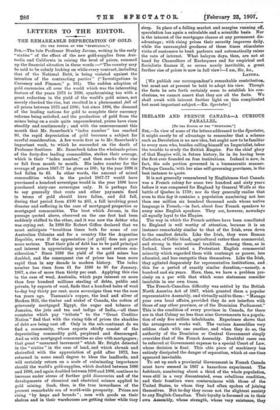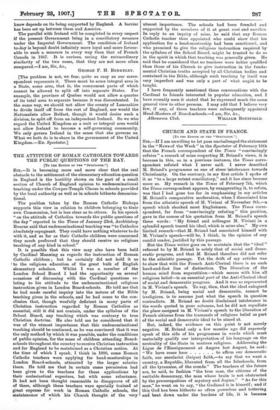IRELAND AND FRENCH CANADA—A C1TRIOUO PARALLEL.
[To Tax Elmo, or no. "SPETATOO.."]
Sin.,—In view of some of the letters addressed to the Spectator, it might surely be of advantage to remember • that a scheme such as Devolution is no new idea, but ought now to be familitir to every man who, besides calling himself an Imperialist, takes the trouble to study the British Empire. For the chief glory of that Empire will, in future history, lie in its having been the first ever founded on free institutions. Ireland is now, in fact, the sole portion governed in a bureaucratic manner. Perhaps Canada,'with her nine self-governing provinces, is the best instance to quote.
It is not generally remembered by Englishmen that Canada was a French colony for some two hundred and sixty years before it was conquered for England by General Wolfe at the battle of Quebec in 1759; nor do they generally realise that even to this day it contains a population numbering not less than one million six hundred thousand souls whose native language is French,—in fact, about four French speakers to every nine English speakers. They are, however, nowadays all equally loyal to the E'''mpire.
The way in which the French settlers have been conciliated to England is well worthy of attention, because it is an instance remarkably similar to that of the Irish, even down to the smallest details. Like the Irish, they were Roman Catholics, of Celtic blood, agricultural rather than commercial, and strong in their national tradition. Among them, as in Ireland, there existed a Protestant Englieh commercial minority which regarded them with contempt as poorer, less educated, and less energetic than themselves. Like the Irish, they agitated desperately for representative institutions, and this for a period of exactly similar duration,—namely, a hundred and six years. Here, then, we have a problem pre- cisely on a par with that which some statesmen consider ineoluble in our own times.
The French-Canadian difficulty was settled by the British North America' merica Act of 1867, which granted them a popular representative Assembly, and virtually said to them : " Manage your own local affairs, provided they do not interfere with those of any other province, or of the Dominion Parliament." This is the condition of every province in Canada, for there are in that Colony no less than nine Governments to a populsf.- tion of only five million inhabitants. Experience shows thart the arrangement works well. The various Assemblies very seldom clash with one another, and when they do so, the authority of the Dominion or Central Government simply overrides that of the French Assembly. Doubtful cases can be referred at Government expense to a special Court of Law, whose decision is final. This able piece of machinery has entirely dissipated the danger of separation, which at one time appeared inevitable.
To set up such a provincial Government in French Canada must have seemed in 1867 a hazardous experiment. The habitants, numbering about a third of the whole population, were still in a very discontented, even rebellions condition, and their frontiers were conterminous with those of the United States, to whom they had often spoken of joining themselves. But to-day they cause not the slightest anxiety to any English-Canadian. Their loyalty is focussed on to their own Assembly, whose strength, whose very existence, they
know depends on its being supported by England. A barrier has been set up between them and America.
The parallel with Ireland will be completed in every respect if the present Government bring in a conciliatory measure under the Imperial Government. The condition of Ireland to-day is beyond doubt infinitely more loyal and more favour- able to such a measure in every way than that of French Canada in 1867. It is curious, seeing the extraordinary similarity of the two cases, that they are not more often compared.—I am, Sir, &c.,
GEORGE F. H. BERKELEY.
[The problem is not, we fear, quite as easy as our corre- spondent represents it. There must be some integral area in a State, some area, that is, the component parts of which cannot be allowed to split off into separate States. For example, the province of Quebec would not allow a quarter of its total area to separate because it was discontented. In the same way, we should not allow the county of Lancashire to divide itself off from the rest of England, nor would the Nationalists allow Belfast, though it would desire such a division, to split off from an independent Ireland. So we who regard the United Kingdom as a unit or integral area would not allow Ireland to become a self-governing community. We only govern Ireland in the sense that she governs us. What we both do is to share in the government of the United Kingdom.—ED. Spectator.]











































 Previous page
Previous page